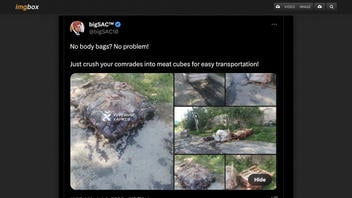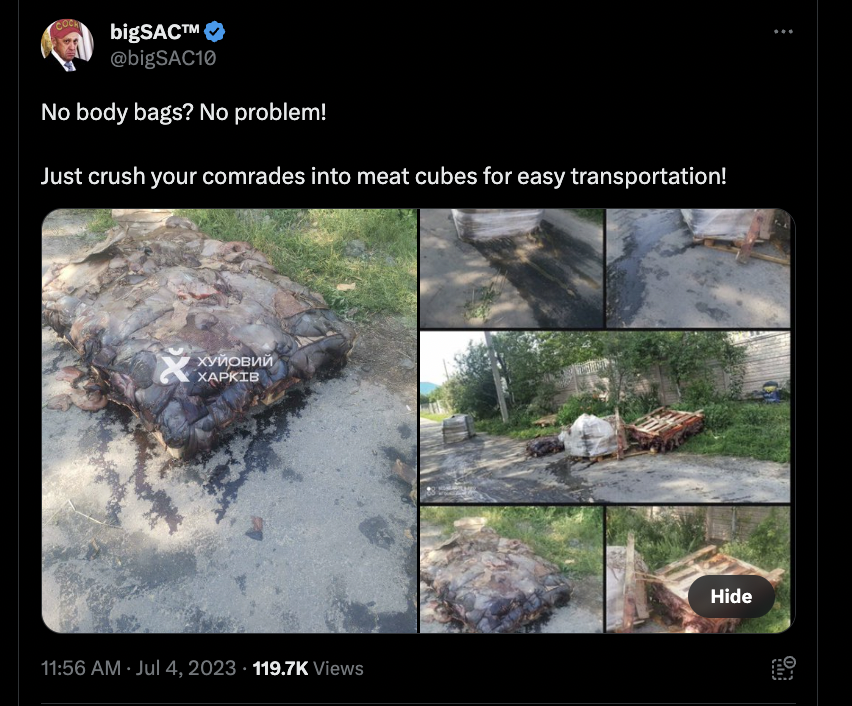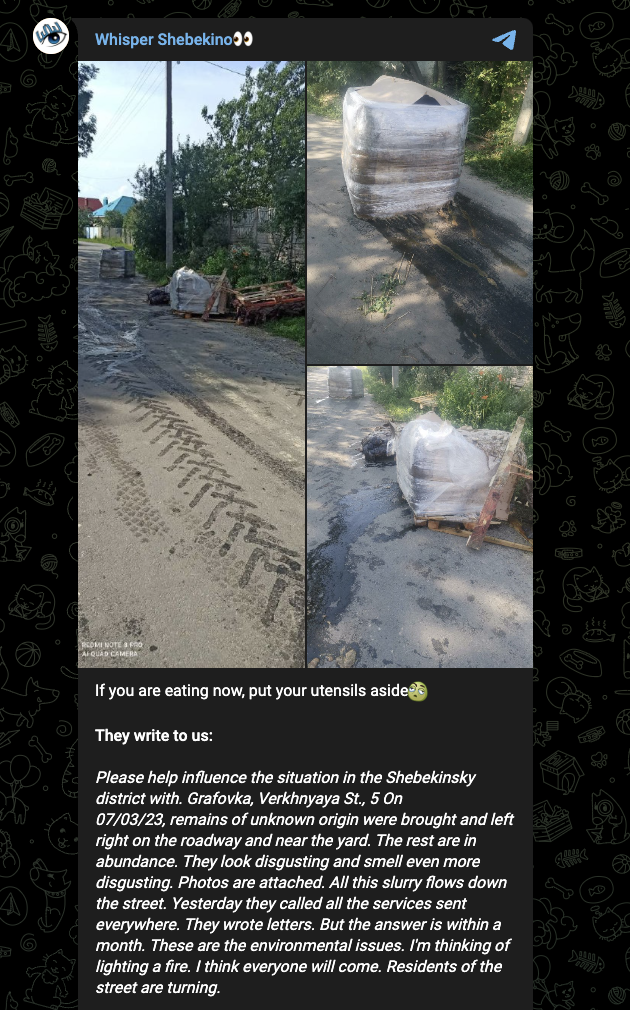
Did a viral photo capture the bodies of Russian soldiers mashed together into a rectangular piece of flesh "for easy transportation"? No, that's not true: The image showed previously frozen but then thawed pet food left in the streets of a Russian village near the border with Ukraine.
The claim appeared in a tweet posted on July 4, 2023. It said:
No body bags? No problem! Just crush your comrades into meat cubes for easy transportation!
This is what it looked like at the time of writing:
The tweet included a variety of photos showing some unrecognizable and unidentifiable mass. In some pictures, it was wrapped in plastic. Others showed the mass uncovered.
Besides Twitter, these images were simultaneously posted on Reddit, 4chan and spread through various English-language Telegram channels (for example, here). Many of the posts claiming the pictures showed human remains contained language that overtly referred to Russian soldiers. Some of those words were "katsaps" and "mobiks." Both are derogatory terms frequently used on Ukrainian social media to describe Russian soldiers. The former is a colloquial description of Russians, the latter is a short form for the "mobilized" that became mocking predominantly because of the context in which it tends to be used.
The tweet which is the focus of this fact check also made a subtle reference to Russians by using the word "comrades," typically associated with the Soviet Union. During the pandemic, Russia amended its constitution, additionally spelling out that it considers itself the USSR's successor.
However, the pictures didn't show the remains of Russian soldiers -- or any other humans.
A search across Telegram channels provided some context: The photos were reported to have been taken by the residents of the Belgorod region in Russia. They complained about a terrible smell on July 3, 2023:
(Source: Telegram screenshot taken on Wed Jul 5 20:44:11 2023 UTC; the post was translated to English by Google Chrome)
The original Russian-language wording of the post did not imply that the pictures showed crushed dead bodies. It included a very specific word "остатки." While it can be translated into English as "remains," it is typically used to describe leftovers, not dead bodies. For that, a native Russian speaker would choose a different word whose spelling, ironically, is different only by one letter: "останки."
The post named a specific location: the village of Grafovka, Verhnyaya Street, building 5. This address is located in the Shebekino district of the Belgorod region in Russia. That area was affected by the war that spilled outside of the borders of Ukraine.
As the shelling intensified, the regional authorities announced voluntary evacuation at the beginning of June 2023. But locals who often did not often have an opportunity to bring their pets with them or did not expect the evacuation to continue for a prolonged period of time complained that the animals were left there without food. On June 2, 2023, the region's governor promised to feed the pets.
On July 4, 2023, Russian-language news websites (here, here and here) reported that a local pet shelter named "Angel" received 2 tons of frozen meat scraps but they were left unrefrigerated in the streets due to a lack of moving equipment. On its page on the Russian social media platform Vk.com, the shelter mentioned that it receives pet food from charity organizations.
Go 31, a Belgorod news website, reached out to the shelter whose owner, Irina Kharitonova, as translated by DeepL, confirmed that they received meat as humanitarian aid but couldn't transport the frozen pet food anywhere further to be able to preserve it:
They brought it in, and we can't get it into the yard. The administration, ecology and veterinary department have already attacked us. We called all the tractors, but they are busy. We don't know what to do. It is unclear when we will be able to clean it up.
On July 5, 2023, another Russian-language website Bel.ru reported that meat scraps were taken away. It cited Deputy Governor of the Belgorod region Julia Tschedrina who said, as translated by DeepL:
At present, the products have been removed. The state veterinary service disinfected the roadway.




















